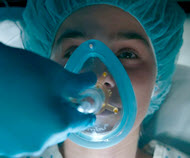Five Feet Apart
 for thematic elements, language and suggestive material.
for thematic elements, language and suggestive material.
Reviewed by: Ruth Eshuis
CONTRIBUTOR
| Moral Rating: | Offensive |
| Moviemaking Quality: |
|
| Primary Audience: | Young-Adults Adults |
| Genre: | Romance Drama |
| Length: | 1 hr. 56 min. |
| Year of Release: | 2019 |
| USA Release: |
March 15, 2019 (wide—2,803 theaters) March 22, 2019 (2,866 theaters) DVD: June 11, 2019 |






Difficulties and fears of individuals and families struggling with Cystic Fibrosis—a lethal genetic disorder that affects the cells that produce mucus, sweat and digestive juices and causes severe progressive damage to the lungs, pancreas, liver, kidneys, intestines, etc.

Why does God allow innocent people to suffer? Answer
What about the issue of suffering? Doesn’t this prove that there is no God and that we are on our own? Answer

Did God make the world the way it is now? What kind of world would you create? Answer
Does God feel our pain? Answer
ORIGIN OF BAD—Why are there bad things in our world? Answer

TRUE LOVE—What is true love and how do you know when you have found it? Answer
For a follower of Christ, what is LOVE—a feeling, an emotion, or an action? Answer

GAY—What’s wrong with being Gay? Answer
What about Gays needs to change? Answer —It may not be what you think.
| Featuring |
|---|
|
Haley Lu Richardson … Stella Cole Sprouse … Will Claire Forlani … Meredith Moises Arias … Poe Parminder Nagra … Dr. Noor Hamid Emily Baldoni … See all » |
| Director |
|
Justin Baldoni |
| Producer |
|
CBS Films Wayfarer Entertainment See all » |
| Distributor |
“Can you love someone you can never touch?”
a beautiful but sad story of an unwell teen’s longing to touch those she loves
Stella (Haley Lu Richardson) has been managing her Cystic Fibrosis for many years along with her family and best friend Poe (Moises Arias). Though she clings to the hope of a lung transplant and puts on a brave smile for her friends and her online video diary, she’s deeply struggling and starting to unravel.
Will (Cole Sprouse), on the other hand, wears a defeatist attitude about his CF and life. He expresses this through sarcastic remarks, dark sketches and noncooperation with his medication regimes. His risk-taking drives Stella to distress.
Put these two together, with a spark of new attraction and the torturous fact that they can never touch one another without jeopardizing the other’s life, and it makes for an interesting perspective on teen attraction and sacrificial love.
Can they survive their strict requirement of “Six feet apart at all times”? Can they survive at all?
Moviemaking Quality
“Five Feet Apart” is a well-made film which I’m told takes its dialog word-for-word from the novel. I appreciated its realistic depiction of medical routines and unwell bodies (largely thanks to clever make-up), brilliant and sensitive acting, and overall artistic quality. Unrealistic aspects are few and far between.
Spiritual and Moral Issues
Given that Stella and Will are facing such short lives and potentially difficult deaths, it is not surprising that time is spent dwelling on whatever hope they may have, and how they can regain any kind of control. Though they embrace art, meditation, friendships and various therapies to attempt care for their minds, bodies and souls, they neglect to turn to their Maker who knows their deepest needs and can give comfort that even death can’t steal. Though Stella reads a book about Life, Death and Immortality, she seems to not pursue the One who is immortal and offers eternal life and freedom from Earth’s evils.
Instead, the most striking theme of the film is the idea that human touch—particularly from a partner—is essential for human coping. This reminded me of how Jesus, too, went out of His way to kindly touch many of the people He helped, especially those deprived of the touch of their loved ones due to their disease.
Unfortunately, however, the assumption of this story is that the kind of touch teens need includes sex with their partner. A lot of screen time is given to CF sufferers longing to ‘be normal’ and to touch one another the way they want to. This is an understandable struggle for them, but also a worldly perspective, as sex is designed by God to only occur within the safe commitment of a marriage relationship.
PURITY—Should I save sex for marriage? Answer
Is formalized marriage becoming obsolete? What does the Bible say about marriage? Answer
How can I deal with TEMPTATIONS? Answer
How far is TOO FAR? What are the guidelines for dating relationships? Answer
About marriage in the Bible
About ANGER in the Bible
The other moral issues highlighted are when and how it is okay to touch others, the importance of boundaries and personal consent and the impact that our choices have on those around us.
Given the intense subjects of the film, intense forms of self-expression are not surprising. Characters yell, cry, swear, demand, lash out and blame. Someone sketches negative and angry images, including a grim reaper to signify impending death.
Apart from this there are no direct references to God, angels or the occult—apart from swearing. There is about as much swearing as is common among teenagers who are experiencing difficulties.
Positive Messages
“Five Feet Apart” sheds light on what occurs behind closed hospital doors for young people who face serious illnesses such as Cystic Fibrosis. It contains many beautiful and thought-provoking moments which contain valuable lessons for viewers. It cherishes life and hope.
It upholds the importance of not facing life alone. And it will encourage teen and young-adult viewers to imagine entering exclusive relationships which can grow and develop strength even without touch and sexual contact.
Characters discuss the value of life, someone’s conviction that there must be something more beyond death, and that, “To understand life you have to look at death.” It is said, “Maybe death is just the next life an inch away.”
As Christians, we know how true this is, because once we’re saved by Jesus advocating for us to God, Heaven is our spiritual home to return to following physical death. We have an inheritance that nothing can steal: not even death. So death has lost its sting.
Despite lacking the above hope, many of the heroes do great things and teach each other good character. In relationships, they grow in terms of using forgiveness, courage and selflessness to overcome fears and difficult realities. This matches the kind of love taught by Jesus and His apostles, rather than a merely romantic form of love.
Content of Concern
There is a preoccupation with sex, that’s for sure. This does not involve the usual combination of flashy cleavage, dirty dancing, suggestive comments, muscle flexing and sex scenes, but it is nevertheless frequently referenced and will stick in viewers’ minds for days, if not weeks. Over 20 comments or images include sexuality.
There is a scene of a woman standing at the bathroom mirror in her bra while washing. There is one pool scene where characters strip to their underwear, and the camera lingers long on each area of the front of their bodies. Among all these sexual references there is no mention of marriage being a consideration, except perhaps in the case of a Gay friend.
Heavy topics are dealt with, such as sibling death, survivors’ guilt, abandonment, doom, control issues, chronic and terminal medical conditions, loneliness in hospitals, perilous moments and severe grief.
Suicide is mentioned, and a little dread is built regarding this. Frustration is a frequent occurrence, and the quality of acting causes viewers to share in the shocks, distress and suffering of lovable characters. “Preemie” babies are part of the story too.
There is very little violence, apart from what I’ve already mentioned, because the main characters are not able to touch one another. The most violent moment occurs when someone trashes their own room due to the agony and anger of grief.
At times some sinful and dangerous behaviors are depicted in a way that could be perceived as promoting them, or at least certainly not condemning the wrong choices. Some messages are unhelpfully vague, such as “Touch him. Touch her.” This I could easily imagine leading teens into temptation or hasty folly.
I’ll also mention that there is plenty of coughing, mucus, vomit, choking and struggle to breathe. Medical emergencies occur.
Bad language: f-words (2), s-words (7), b*llsh*t (2), h*ll (2), d*mn (2), a**hole (2), b*tch, scr*w (2), “do it,” s*cks, b**bs, and “hoe.” God’s name is misused on at least 11 occasions.
Sexual references: • Bikini try-ons (over clothes) • “too trampy or not trampy enough” • “use protection” • sneaking into a room for sex • impolite comments about this • discussion of 3 Gay relationships • woman twice shown topless except for bra • man once shown topless • sex joke disrespectful to Catholics • character says she’s choosing a dress because it is see-through • discussion of sexiness • foreplay scene • a slow stripping off to underwear (male and female) • “screw him” • latex protection (regarding gloves)
Drugs and Alcohol: Champagne or white wine is consumed at a secret party, possibly while one or more attendees are underage. A character speaks in a slurring, drugged manner while an anesthetic is wearing off.
Summary
Taken altogether, I do not think this film is suitable for its target audience of teenage girls. Its emotional intensity and focus on sex make it sure to unsettle and confuse some. Yet it is a film with some value and that may be of interest to discerning adults—with a warning to beware of the sexual content, bad language and heavy themes.
- Sex: Heavy
- Vulgar/Crude language: Heavy
- Profane language: Moderately Heavy
- Nudity: Moderate
- Violence: Mild
- Occult: Mild
See list of Relevant Issues—questions-and-answers.


PLEASE share your observations and insights to be posted here.


